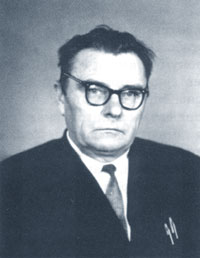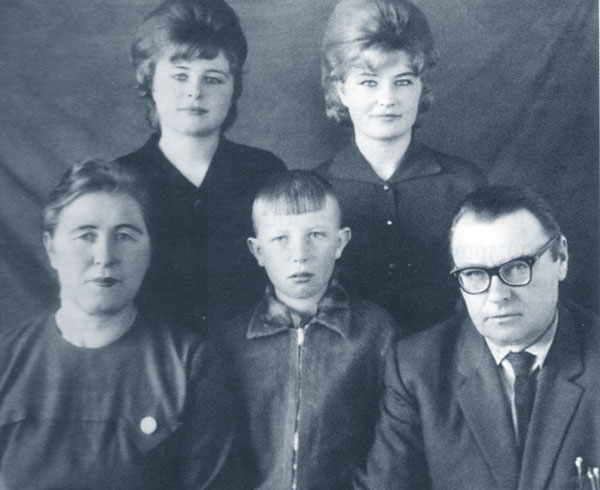









 I burdened myself with a difficult task: I would like to write about my
grandfather’s life. The problem is that I never met him personally. He died four
years prior to my birth, but it seems as if I know almost everything that
happened in his life. It is like a mosaic display, which was composed by various
reports of my grandmother, my father and other relatives, as well as numerous
photographs and documents. I have a very strange feeling – I have the impression,
as if, in actual fact, I have been sitting on his knees when I was a child,
while he was telling me fairy tales, and I can somehow see him before my face
taking a walk with me in the copse, which was not far from home. A strong
feeling of kinsmanlike relatedness. I am proud of him, proud of the surname he
passed on to me.
I burdened myself with a difficult task: I would like to write about my
grandfather’s life. The problem is that I never met him personally. He died four
years prior to my birth, but it seems as if I know almost everything that
happened in his life. It is like a mosaic display, which was composed by various
reports of my grandmother, my father and other relatives, as well as numerous
photographs and documents. I have a very strange feeling – I have the impression,
as if, in actual fact, I have been sitting on his knees when I was a child,
while he was telling me fairy tales, and I can somehow see him before my face
taking a walk with me in the copse, which was not far from home. A strong
feeling of kinsmanlike relatedness. I am proud of him, proud of the surname he
passed on to me.
My grandfather’s fate is similar to numerous fates within his generation in many respects. He was born at the river Volga in 1918, just at a time when the civil war was raging in a particularly cruel way. He also witnessed all the fright and scare of the 1930s, the calamitous years of war during the 1940s, the hopes of the 1960s, the stagnation of the 1970s. His life – that’s the tragedy of a man who, due to external circumstances, was restrained from following the path of life he would have liked to take..
My grandfather’s name was Friedrich Filippovitch Leisle. Some words about our family. We are from the Volga. As Church records prove, the first Leisle came to Russia in 1774. His name was Friedrich, just like my grandfather’s name, and he was then 16 years old. At that time Catherine II – the Great – ruled the country. All his descendants were tillers, who would seldom leave the Volga Region. It is known that on of my ancestors – Georg - took an active part during the Crimean War, and my great-grandfather was an ordinary foot soldier in World War I. The civil war dispersed the family members into all parts of the world. Some emigrated to the USA and to Canada right after the infamous big famine, which afflicted the Volga Region. Grandfather was born in the village of Issenburg; his father was a farmer - Filipp Georg Leisle, who used to earn money by casually working as a joiner. He was a master, a practitioner; I found a number of objects yet, which he made by his own hand: a little linen closet, bookcases, a flower-stand, a buffet. He had a big family, everybody was working diligently, but nonetheless his children received a good education. Grandfather successfully completed 10 school-classes. He started his professional life as a technical secretary with the district newspaper, afterwards he became one of the instructors with the Comsomol district committee, from where he was later sent for a course of study at the regional military political professional school. He studied there for two years. Grandfather manifested himself about this professional school with utmost respect, and he said to his father that these two years helped him to become a good soldier. Shooting practice, marches over a distance of 50 kilometers across the hot Volga steppes, with a daily foot ration of just two herrings and a bottle of water – this immense physical strain helped him a lot during the first – the most dramatic – months of the war. The most wonderful laud and mark of recognition for him is an entry in his personal file, resulting from the times of his seminar life. The column „physical preparation“ shows the entry „has proven remarkable perseverance – like a dog“; he was very proud of this. In the summer 1940 he was removed from office (then being in the rank of a junior political instructor) in order to form up with the army in one of the Baltic States; he was based in the city of Riga. The evening before he left he got married to my grandmother, whose (maiden) name was Amalie Post; she was a miller’s daughter from the village bearing the beautiful name of Blumenfeld (field of flowers).
For my grandfather the war began in July 1941. Soonafter he got a new position: he was no longer a political cooperator, but became one of the troop officers and company commanders. In the course of the battles he was forced to withdraw from Riga all the way up to Leningrad. Till October 1942 grandfather was defending Leningrad, and even managed to survive the horrible winter of 1941-1942. He new about the price of bread better than anybody else. His troop unit was fighting not far from the famous „Neva Pork Snout“ (Neva bridgehead; translator’s note). In 1942 grandfather received the rank of a captain and was awarded a medal for his bravery. In 1943 it was added by the medal „For the defense of Leningrad“. And then began the inconceivable, dramatic fate which befell all „Russian Germans“.
In October 1942 the are demobilized from the Red Army by Stalin’s order. However, it is quite strange that my grandfather was only recalled to the reserves in April 1944. In 1943 he finds himself at the Volkhovsk front – working for the political department of the 8th Army, a department which is engaged in propaganda for the enemy troops. It was a very dangerous and difficult job. Grandfather had to deal with documents captured from the enemy and with pirsoners of war. The most important material for their propaganda campaigns they would extract from letters of killed German soldiers. They used to read out quotations from these letters to the enemy troops. Occasionally, they would just switch on some music, mainly classical, but my grandfather could not enjoy it. As a general rule, all this started quite early in the morning. Some vehicle equipped with special appliances approached one of the frontal sections. Soldiers would fix loudspeakers near the neutral strip of land. And then began a transmission in German language. A minute past 10 the Fascist grenade launchers would open fire with the objective of drowning out the loudness of the radio programme. It was only too well, when this action ended just with the destruction of technical equipment; sometimes things did not turn out all right.
During one of this scenarios a hostile grenade hit the dug-out, where grandfather had taken shelter. He regained consciousness only one week later and spent many weeks in some military hospital – he was seriously wounded and – as a consequence – was forced to wear glasses for the rest of his life..
Later he got to Ulyanovsk to the first armoured vehicle technical school by fate; afterwards he held lessons at the school of espionage. He taught his students how to prepare a fight and how the statutes of the German Wehrmacht looked like, but this phase did not last for a long time. Somebody denounced him in written form, which was followed by a close examination of the case and finally ended up without any serious consequences. One of Stalin’s orders had been violated, but nonetheless grandfather continued to officiate various positions within the Red Army for another two years. In 1944 he was demobilzed to the reserve batallion and set off for the hamlet of Berezovskoye, Krasnoyarsk Region, where almost all of his relatives had been deported. The others were less fortunate: those who were older than 14 years, were sent to the labour army. Many did not succeed to survive and later reunite with their families.

Friedrich Filippovich Leisle, Amalia Yegorovna, son Eduard,
their daughters Albinea and Valentina
Grandfather starts his civil life in the hamlet of Berezovskoye, where he is offered the position of a senior book-keeper for the butter factory. From reports given by his father I know that my grandfather did not like to talk about the war and never used to watch war films, but he enjoyed reading the memoirs of military leaders and, as he said himself, serious writers, such as Simonov, Chakovskiy – exceptionally his book „The Blockade“. Grandfather loved and adored the people living in Leningrad and tried his best to pass on this affection to my father and me, although we have never been to this town on the river Neva.
In accordance with statements given by my relatives, grandfather was a very active man, who totally concentrated on his work tasks. Early in the 1960s Khrushchev’s reforms reached the village of Berezovskoye, which ended up with the amalgamation of kolkhoz farms, all the fallow land was ploughed up. Hence, this policy led to the beginning of the „Avantgarde“ sovkhoz in the hamlet of Berezovskoye, then comprising two local kolkhoz farms, as well as the kolkhoz organisations from the surrounding villages. Ivan Nikolayevich Beregovoy became its first director. He proposed to appoint my grandfather for the position of a senior book-keeper. After a certain time the „Avantgarde“ sovkhoz became the leading agricultural organization in the Nazarovsk District, and this is exactly why, in 1967, they suggested I.N. Beregovoy and my grandfather to head a new sovkhoz farm – the “Altatskiy“ grain sovkhoz, which soonafter got to full bloom. Grandfather was employed there till the end of his life. The people in our village commemorate him with utmost respect, for he was a most good-natured, understanding and straight man.
What remains after a person’s death? Remembrance. And it is the stronger, the more impressive a person’s life was. In many respects grandfather’s life was affected by dramatic developments and incidents. Can we call it a successful life, after all? Basically – yes. For he was a respected man, highly professional in his field of activity. He managed to give his children a wonderful education, they all attended secondary schools. All of us, his children and grandchildren, will proudly cintinue to carry on his name. .
Veronika Leisle, hamlet of Novoaltatka
My beloved little home are, Sharypovo District, Krasnoyarsk 2006